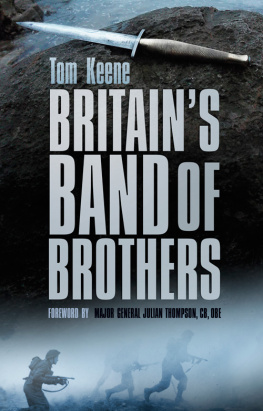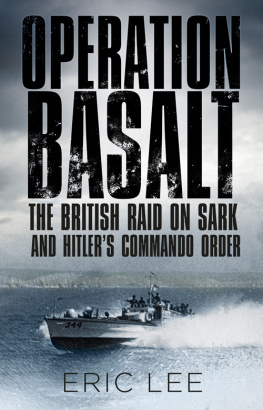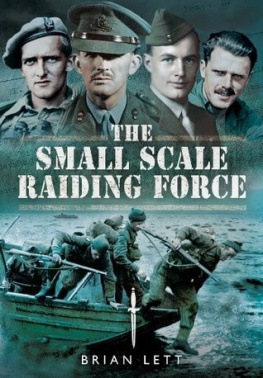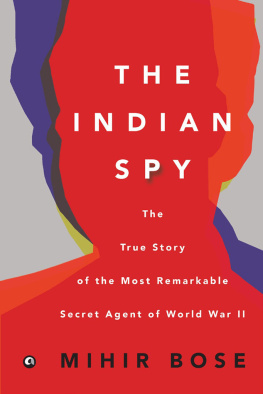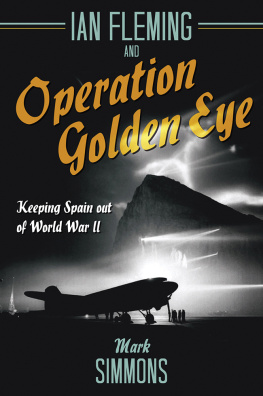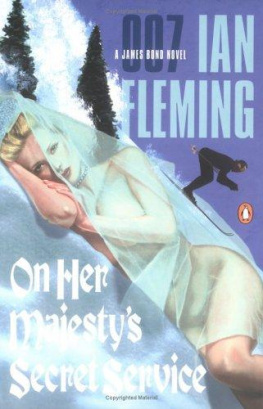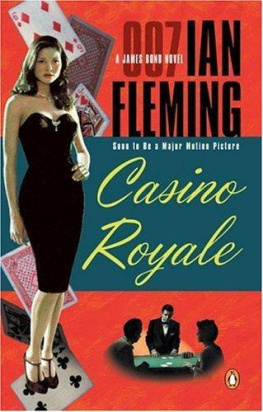APPENDIX 1
Full list of personnel engaged on Operation Postmaster
This list is compiled from the contemporaneous report submitted by Major Victor Laversuch in January 1942, from the Admiraltys investigations during the prize proceedings after the war, and from the later recollections of those actually involved. All the official lists seem to suffer from error. Lieutenant Duff is missed off Laversuchs list, but undoubtedly took part. Borge Franck is included on the later Admiralty list, but the evidence makes clear that he did not actually take part in the operation. The presumption must be that he was absent sick. In the list of Maid Honor Force personnel, the numbers 01 03 come directly from the contemporaneous reports still available, the numbers 04 011 are in order of rank and then alphabetical order, but do not appear on the written lists.
No record appears to survive as to who the three friendly Spaniards actually were.
Maid Honor Force
| W.01 | Captain Gustavus H. March-Phillipps |
| 02 | Lieutenant J. Geoffrey Appleyard |
| 03 | Lieutenant Graham Hayes |
| 04 | Lieutenant Leslie E. Prout |
| 05 | CSM Tom W. Winter |
| 06 | Matre Andr J. M. Desgranges |
| 07 | Private Ernest F. Evison the units cook |
| 08 | (Private Borge Franck absent sick) |
| 09 | Private Anders F. E. V. S. Lassen |
| 010 | Private Frank C. Buzz Perkins |
| 011 | Private W. M. Jock Haggis Taylor, March-Phillipps batman |
| 012 | Private Dennis F. G. Tottenham (ex-Sub Lieutenant RNVR) |
| 013 | Unidentified, believed to be Danish |
SOE (Lagos)
W10 Lieutenant C.A.L. Guise
W30 Captain D. E. Longe MC
W39 Major L. H. Dismore
Major John Crosthwaite Eyre
W18 Lieutenant R. A. McKenny
W36 Second Lieutenant H. A. Schoofs (Dutch)
Nigerian Marine
(a) ST Vulcan
Tugmaster (Chief Warrant Officer) T. C. T. Coker
Lieutenant Duff
Lieutenant Commander J. A. K. Oldland Chief Engineer
Lieutenant Commander J. O. C. Duffy Second Engineer
M. G. Hammond Junior Assistant Fire Superintendent, Grade II
L. Gbadamosi Junior Assistant Fire Superintendent Grade II
T. Gansallo Fitter
S. Bassey Donkeyman
J. Chukuma Greaser
Peter Ebu Fireman
MacKintosh Fireman
New Year Fireman
T. Obata II Fireman
J. Ofuokowu Fireman
M. Borugu Fireman
A. Anudu Fireman
D. Atagama Fireman
(b) MT Nuneaton
Lieutenant K. H. Goodman
O. Hanson Driver, Messrs Elder Dempster Shipping Co. Ltd
Olu David Second Driver, Messrs Elder Dempster Shipping Co. Ltd
Colonial Service Civilian Volunteers
R. G. Henderson Senior Assistant Superintendent of Police
H. John Harris Superintendent of Police, Head of CID, Lagos
D. S. Fountain Assistant Superintendent of Police
A. Cooper Assistant Superintendent of Police
V. B. V. Powell Education Officer
W. T. Mackell Senior Education Officer
H. H. Jeffers Acting Principal, Kings College, Lagos
E. R. Ward District Officer
A. F. Abell District Officer
W. F. H. Newington District Officer, Ilaro, later Captain of Bicycle Patrols
E. le Mare Senior Accountant, Treasury Department
J. W. W. Hallam Water Mains Superintendent, Public Works Department
D. H. Lawson Executive Engineer, Grade I
J. W. Tallentine - Executive Engineer, Grade I
F. W. Bailey Storekeeper, Public Works Department
E. G. Fitt Legal Assistant, Land and Survey Department
Dr J. G. MacGregor Specialist, Medical Department
Three friendly Spaniards (names unknown)
In Santa Isabel
W25 Richard Lippett
W51 B. Godden
W53 Peter Ivan Lake
Abelino Zorilla
Vice Consul Alan Michie (until December 1941)
In Lagos
W4 Major Victor Laversuch
W26 G. Sweetman
Mrs Broadbent, Secretary
Mrs Hughes, Cipher Department.
APPENDIX 2
The citations
Captain Gustavus Henry March-Phillipps, MBE, Royal Artillery was awarded the Distinguished Service Order.
Captain March-Phillipps was in command of the operation for the cutting-out of the 10,000 ton Italian liner Duchessa, and the smaller German vessels, Likomba and Bibundi, which were lying in the neutral harbour of Fernando Po. The Operation took place on the night of 14 15 January 1942.
The operation was of a most delicate and difficult nature, owing to the over-riding necessity of ensuring that no direct evidence of complicity on the part of the British Government or participation by British Forces would be secured by the Spanish or Axis Governments. It was known, moreover, that the Duchessa dAosta with her deep draught, was lying in a very narrow channel, any divergence from which would run her aground.
The nucleus of the cutting out party was formed by the crew of the SOE ship, Maid Honor, a Brixham trawler of some 60 odd tons which sailed out to West Africa from Poole in September 1941, under the command of Captain March-Phillipps. The crew consisted of five army officers and other ranks, and this successful voyage in a time of war was in itself a considerable feat.
On the night of the operation, when the harbour of Fernando Po had been safely entered, Captain March-Phillipps according to his plan detached Lieutenant G. Hayes and party in one tug to secure the German vessels, while himself in another tug proceeded towards the Duchessa dAosta.
Leading the boarding party himself, he leapt on board as soon as the tug had approached sufficiently close, followed by the demolition parties whose task was to blow the holding cables with specifically prepared explosive charges.
All opposition was quickly quelled and the 28 Italians put under guard, while the cables were blown, and the tugs hawser made fast, and the Duchessa dAosta got under way. Captain March-Phillipps himself took command from her bridge of navigating her in the dark along a narrow channel. This was successfully accomplished and by daylight the convoy was below the horizon, and after a difficult passage reached Lagos safely.
Captain March-Phillipps displayed military qualities of very high order in his successful execution of this very difficult task, which secured for the British Government a 10,000 ton liner carrying a cargo valued at several hundreds of thousands of pounds, in addition to two smaller but valuable vessels. By his leadership and by his skill in training, planning and navigation, the operation was completed without any effective opposition from the enemy, or any trace of its origin becoming known.
Captain J. G. Appleyard MC, RASC, was awarded a Bar to his Military Cross.
Captain Appleyard was second in command of the operation for the cutting out of the Italian liner Duchessa dAosta and the German vessels Likomba and Bibundi at Fernando Po. The operation took place on the night of 14/15 January 1942.
Captain Appleyard led the party which was to blow the forward anchor chains, boarding the liner from the tug which carried his party. Owing to a slight recoil as the tug made contact with the liner in the dark, Captain Appleyard was faced with a rapidly widening gap between the steamer and the tug, and he was the only member of the party to attempt the jump, gaining the steamers side over a good eight feet of water. He then dealt single-handed with the forward cables until the rest of his party came up. One of the charges failed to explode on the prearranged signal and Captain Appleyard, without waiting to see if the fuse was still burning, laid and blew another charge in less than a minute, thus ensuring the freeing of the liner which was a matter of vital importance. These operations were performed with complete disregard of his own personal safety, and the cutting out of the liner was ensured.




